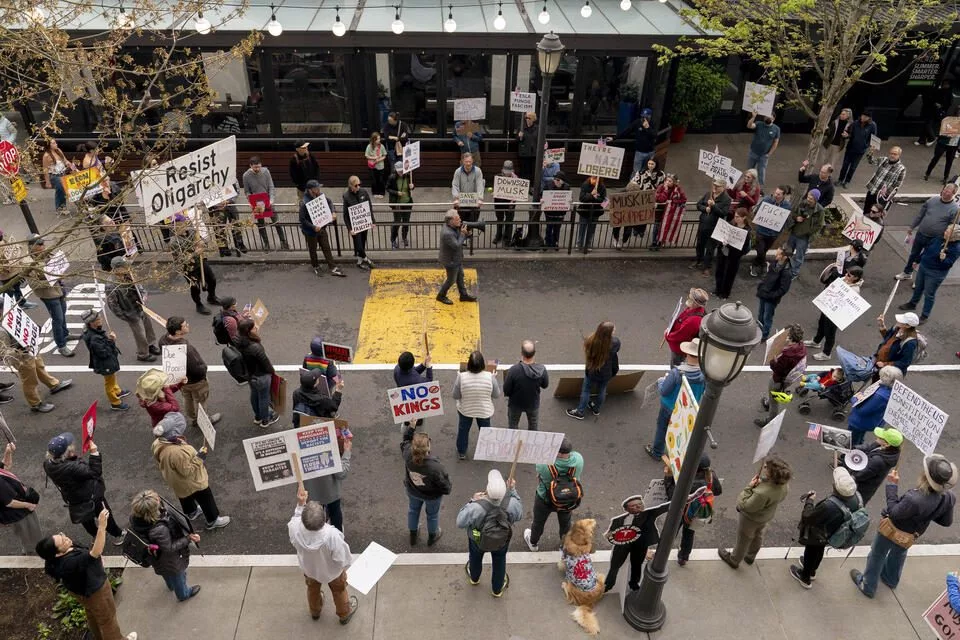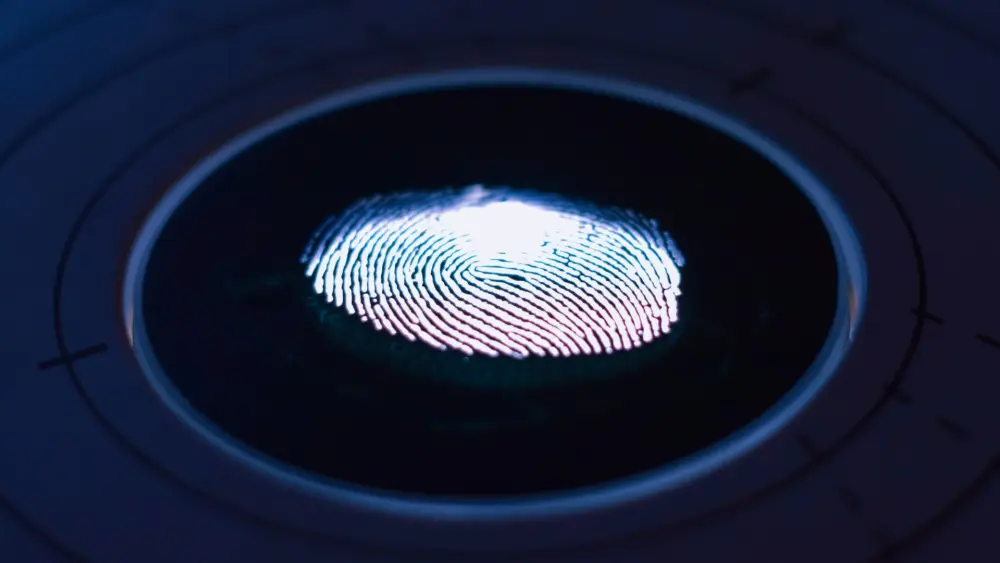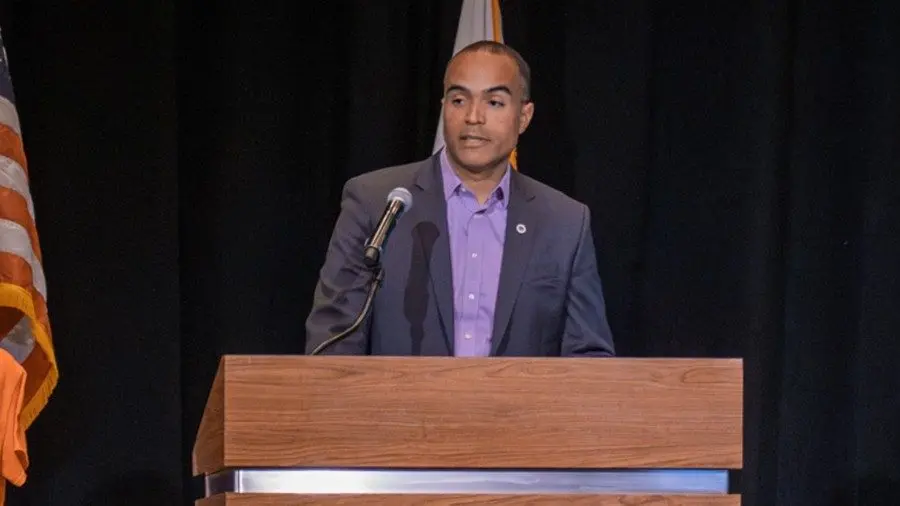While anti-Musk and anti-Trump protests continue to attract dozens, the EVs are still on the streets — but their popularity shows signs of slipping.
SEATTLE, WA – Yvette Blauvelt arrived at Seattle’s University Village with a “cone of shame.”
A Tesla owner since 2019, she felt as if she had to justify why she was at the protest against Tesla CEO Elon Musk held biweekly at the upscale mall. So she brought a pet recovery cone to wear around her neck, and a picture of a sad dog.
“I love my car. I don’t love what’s going on with Elon Musk,” Blauvelt said.
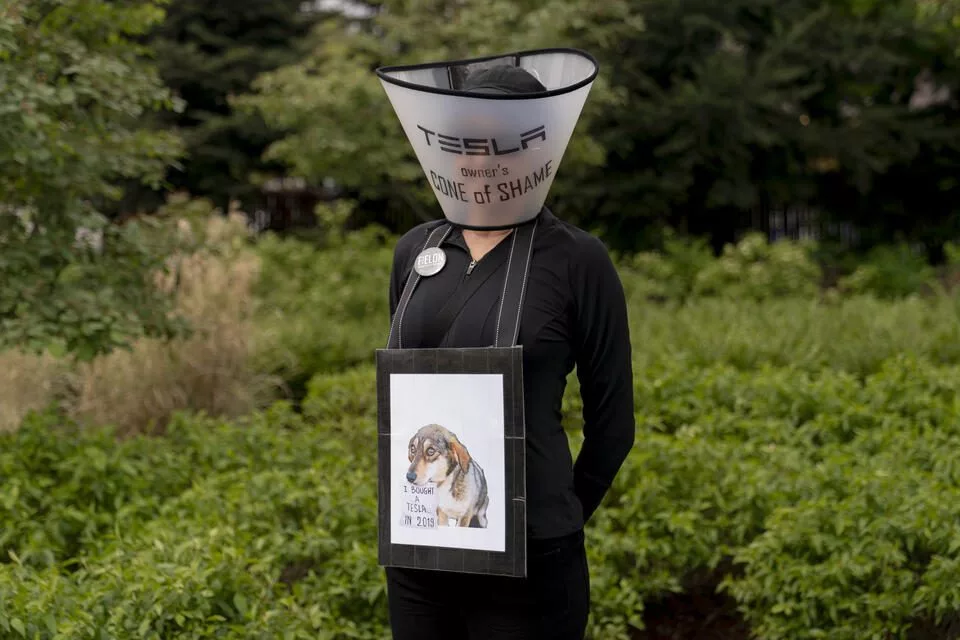
Since March, dozens of people have gathered at University Village on Tuesdays and Saturdays, holding posters expressing their frustration with Elon Musk and President Donald Trump. While a few gatherings drew as many as 800 people carrying signs and shouting slogans throughout the mall, recent ones have continued to attract about 120 people weekly who picket for two hours at the mall’s Montlake Boulevard/45th Avenue Northeast entrance.
It’s not the only protest location. Weekly gatherings continue at Tesla dealerships in South Lake Union, Bellevue Square, Tacoma and Lynnwood, as well as at other dealerships around the country and the world.
Posters decry various topics, from the administration’s increased emphasis on arresting undocumented people to executive orders cutting science, health and education programs.
But many of the signs target Elon Musk specifically, and his most famous brand, Tesla, calling the vehicles “Swasticars” and comparing Musk to a Nazi.
For the past several years, Musk has drawn increasing criticism for his growing involvement in politics, including campaigning for Donald Trump and becoming the country’s largest political donor in 2024. After Trump’s election, the president gave Musk a high-profile role with the newly created Department of Government Efficiency (DOGE), which set about trying to slash billions of dollars in programs – including from biomedical research programs, humanities programs, domestic and international aid programs and more – in the name of cutting waste and fraud. Critics have said the cuts will hurt the most vulnerable.
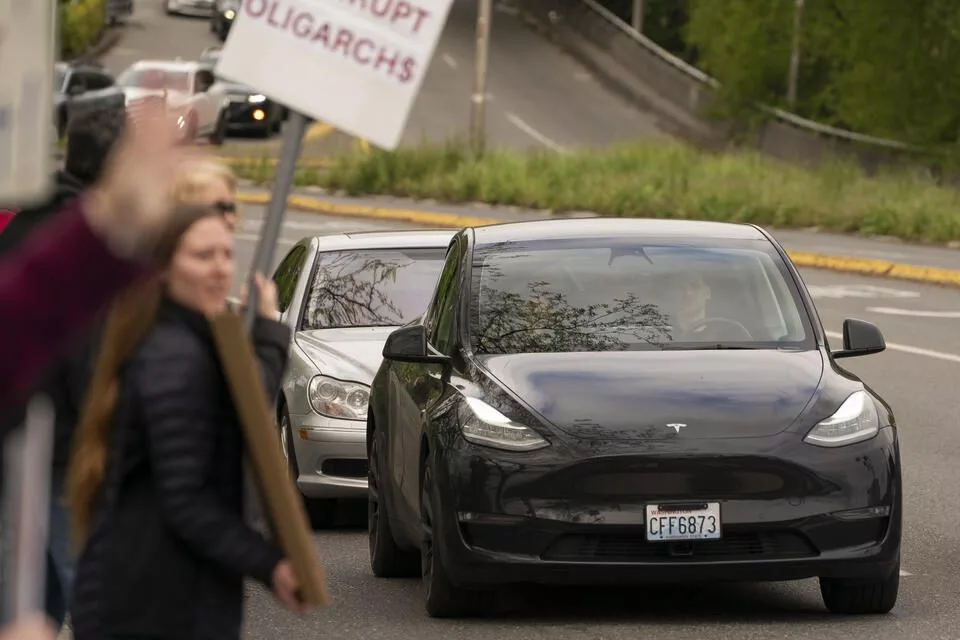
“Tesla is Elon Musk,” said Peter Weston of Troublemakers, one of the groups that coordinates the weekly gatherings at University Village. “We’re not mad at Teslas. Years ago, Teslas were purchased by people trying to do the right thing … One way to go after him is to go after his empire.”
Another organizer, Devin Hermanson, said he was inspired to protest at Tesla dealerships because he was concerned about Musk’s involvement in politics and DOGE. He purchased the domain DefundMusk.com, which became a hub to help facilitate Tesla protests around the world.
“He’s hurt a lot of people without any understanding of the lives he’s dismantling or the lives he’s hurting. He and Donald Trump, they only worship money. That’s what they respect and that’s how we’re able to fight back,” Hermanson said.
It’s not the only way that people have been protesting. Blauvelt, like many Tesla owners, has put protest stickers on her car including “Clean energy, not white supremacy” and “F Elon.” Others have taken it further, “debadging” their Teslas by removing the logos.
Washington seems to be the type of place where Teslas should thrive. The Seattle Times recently reported that Tesla ownership is overrepresented in Seattle, where most electric vehicles in this state are sold, which means a person is more likely to find a Tesla owner in Seattle than in other parts of the country.
About 20% of all new vehicle sales in Washington are electric, and the state has set a goal of having 35% of all new passenger vehicle sales be electric.
And until this year, more than half of those sales had involved Teslas. But there seems to have been a slight shift: For the first two months of 2025, that number slipped to 46%. Earlier this year, KUOW reported that in February, new Tesla sales in Washington had slipped 35% from the year before.
Tesla has shown other cracks. In the first quarter of 2025, U.S. sales declined about 9% from last year, though Tesla still dominates the EV market, according to Canary Media, a clean-energy-news organization. In other countries, that decline has been much steeper, including drops of 46% in Germany and 62% in the UK.
The publication cited a number of reasons for the plunge, including increased competition, a lack of new models and the anti-Musk movement.
Even though Musk said last month he would step back from DOGE to refocus on Tesla, Hermanson said they’re not done protesting.
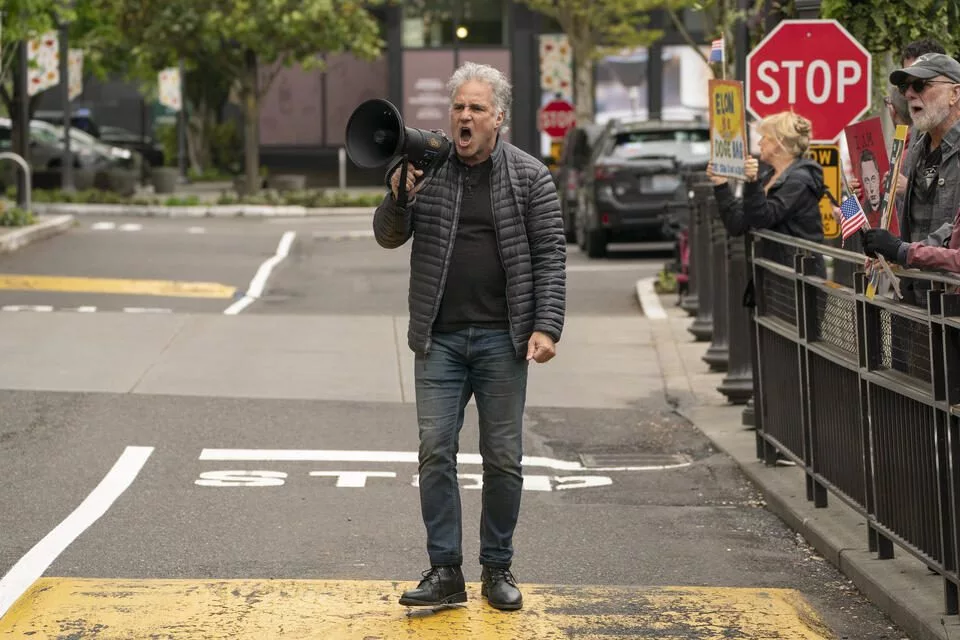
“He’s still willing to plunge hundreds of millions of dollars into elections,” he said, pointing out that Musk has threatened to primary Republicans who don’t toe the MAGA line. “That kind of dynamic is absolutely fatal to our democracy.”
Shelley Adams, who attended a recent Tesla Takedown protest, said the past election cycle and the start of Trump’s second administration changed her mind about Musk — whom she never really thought about before.
“I thought he was probably a great person prior to that. I really thought he was doing good work with electric cars,” Adams said.
She went from never having protested to frequenting many local demonstrations, primarily to find others who were similarly disillusioned with Trump and the federal government.
“You watch the news, and it feels devastating, every day. And you come out to be with people who are protesting, and feel a little better,” Adams said.
Weston of Troublemakers said that there might be something to learn from the Tesla protests’ ongoing nature.
“That’s something I’m thinking about – how do we continue to engage these people and not lose them?” Weston said. “There’s a whole bunch of new people who are out here who are engaging for the first time.”
Blauvelt, the contrite Tesla owner, similarly didn’t start protesting in the United States until after Trump’s second election. Now she’s part of the Handmaids of Washington, who appear at protests dressed as the oppressed women from The Handmaid’s Tale, a television show and book that depict a dystopian society where a totalitarian government has taken over the United States.
But Blauvelt said she remembered attending university in South Africa when Nelson Mandela was put in prison by that country’s apartheid government, which was based on segregation and white supremacy.
“I can’t believe all these years later, that history is repeating itself,” she said.
Visit cascadepbs.org/donate to support nonprofit, freely distributed, local journalism.

